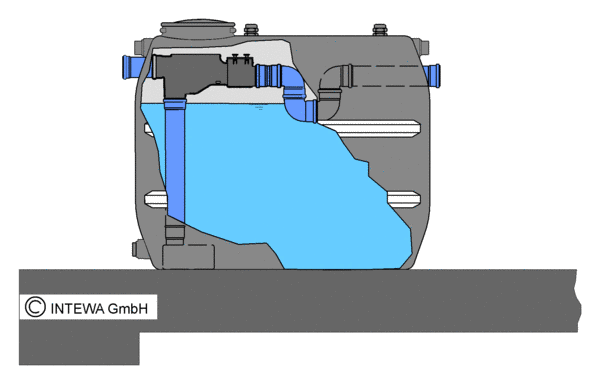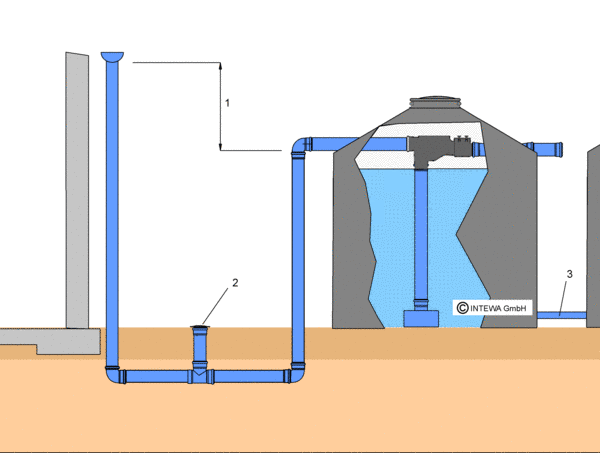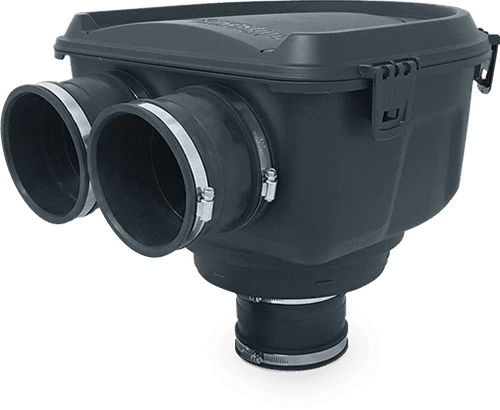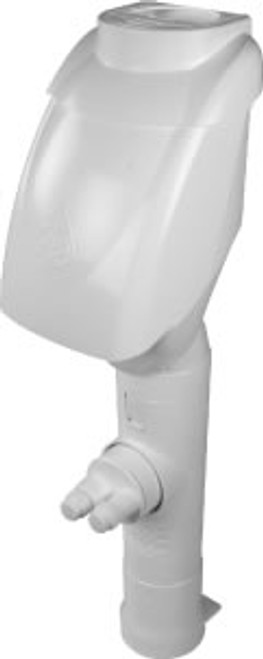Product Overview
The PURAIN Rainwater filter, also known as the hydraulic jump filter, is the innovation for roof areas typically found in single family dwellings.
This hydraulic jump technology cleans itself automatically. The design model for PURAIN Rainwater filters comes from nature: At almost every course in a stream, you can see how the hydraulic jump functions. The water flows over one of the stones, smooth and rounded by the action of the water over time. The water flow is substantially changed by the height drop, from a sub-critical to a super- critical flow. At the bottom of the dip, the waterflow changes again to a subcritical flow in a process now commonly known as hydraulic jump. This resulting increase in water power is similar to a strong eddy and any impurities are then forced over the next level and washed away downstream. Finally a filter that is low maintenance and self-cleaning!
Documentation:
Brochure
Dimension Drawing
ACCESSORIES
Best water quality
The PURAIN Rainwater filter provides optimum water quality in your tank. The rainwater filter is designed to filter rainwater coming off roofing made from clay brick, shales, metal, glass or concrete stone.
Note: Green roofs or bitumen sealed cardboard roofs can lead to the water becoming discoloured. Samples analyzed by us confirm an excellent quality of water. The water is best suited for use in flushing toilets, in the washing machine and for garden irrigation as well as some other commercial applications.
Using soft rainwater saves on detergent costs, prevents the calcification of piping and appliances and is the most natural thing you can give your plants.
Self-cleans with 98 % efficiency
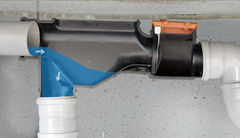
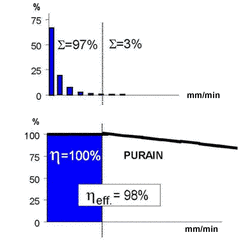
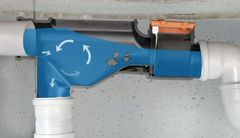
Low rainfalls
Low rainfall events account for over 97 % of total annual rainfall. Therefore, it is particularly important that the filter be designed to collect this light rainfall. While many filters are not designed to collect light falls, the rainwater collected in the hydraulic jump filter tray is then filtered and drained into the tank. The tray ensures that no precious water is lost.
High Rainfalls
High rainfall events, that occur approx. 4 to 10 times in a year, contribute only about 3% to total water yield and are used by the PURAIN Rainwater filter for self-cleaning. These high rainfalls lead to the formation of an eddy in the PURAIN rainwater filter, the so called hydraulic jump, which spins with such great force that even dirt accumulated in the tray is flushed and discharged with the overflow.
The PURAIN Rainwater filter cleans itself during heavy rainfall events. It means minimum maintenance costs for the user in comparison to other filter systems. An overall rainwater filtering efficiency of 98 % is achieved with the unique, self-cleaning PURAIN Rainwater filter.
With the hydraulic jump filter, this water is collected in a tray, which is then filtered and drained into the tank. The tray ensures that no precious water is lost. 7.7 lbs of sand-gravel mixture was flushed away in just 30 seconds during this trial (see photo) due to the efficiency of the hydraulic jump.
PURAIN rainwater filter for the single-family house
The best place to install the PURAIN 100 rainwater filter is in the tank. Now there is no need for separate downpipe filters or separate filtration tanks. The PURAIN Rainwater filter itself can be directly used as an overflow and all roofing downpipes can be connected to one single filter. A lot of tank manufacturers and dealers are already providing PURAIN 100 rainwater filters built-into their tanks. This makes installation of your Rainwater system quick, easy and as per the manufacturers recommendations. Due to its low height offset and its size the PURAIN 100 rainwater filter can be retrofitted easily into most tanks. To follow are a few examples of the PURAIN 100 rainwater filter integrated into various tanks:
PURAIN 150 in concrete or plastic tank
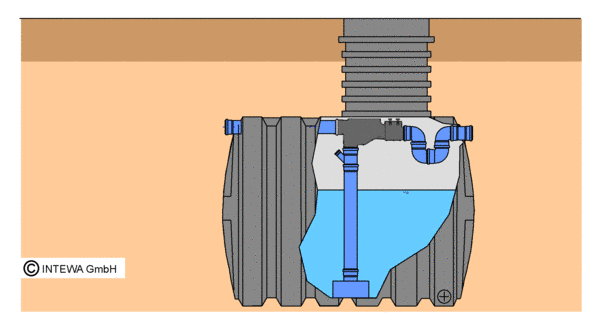
PURAIN 150 in retention tank
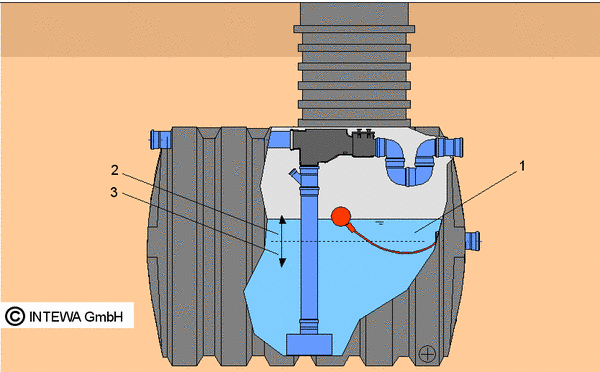
| 1. | floating throttle |
| 2. | retention volume |
| 3. | useful volume |
| 1. | The minimum height differential between the lowest lying gutter an the installed filter height must be 250 mm |
| 2. | Handy inspection T piece (must be watertight)! |
| 3. | If multiple tanks are used they are balanced with a 1” hose or pipe 200 mm off the bottom and then fill as one, PURAIN filter and discharge overflow must be mounted in the first tank |
FAQ
Where can I install the PURAIN rainwater filter?
-
The INTEWA PURAIN filters can be easily installed in most standard tanks of plastic, concrete, indoor and outdoor construction. Many distributors deliver your storage tank already fitted with a PURAIN filter. The PURAIN Filter is also suitable for installation outside the tank if required. HD Filters are designed for direct subsurface installation. While installing the PURAIN filter, make sure that a lower height offset is present between the inflow and the outflow.
Is there a filter without height offset between inflow and outflow?
-
The PURAIN rainwater filter works with the minimum possible height offset between the inflow and outflow. A height offset is a prerequisite for a self-cleaning filter in order to ensure proper operation. Since 1993, INTEWA has accumulated a lot of experience testing different types of self-cleaning filters – none of which, function with a high degree of efficiency. Alternatively, only a collection filter may be used in place of a hydraulic jump, however they have to be cleaned regularly and do not guarantee the best quality water filtering.
Is the rainwater filtered by PURAIN well suited for washing machines?
-
The water filtered by the hydraulic jump filter is perfectly suited for use in toilets, washing machines etc. It should be noted that the quality of water also depends on the storage of the rainwater. Factors, such as temperature of the storage tank, inflow calmer, overflow skimmer, size of tank, etc. are critical for an optimum quality of water.
Does self cleaning = maintenance free?
-
The PURAIN-filter is extremely low maintenance. Dirt and leaves in the sedimentation chamber do not need to be removed because they will be flushed away with the next heavy rainfall. If the sieve does become clogged, it is easily cleaned through the tank lid with a high pressure cleaner. Alternatively, in rare cases, the sieve can be removed for cleaning. Should a filter be mounted in a hard to access place, it can also be cleaned via the installation of a backflushing nozzle. This is available as a PURAIN accessory. We recommend that you check your filter about sieve twice a year.
How is the efficiency in other conditions of rain?
-
The overall efficiency of the PURAIN rain water filter is rated at 98 %. Hereby, the small to medium rainfalls are collected 100 %, but the heavy rains (which account for only about 3 % of annual rainfall yield), are utilized for the self-cleaning function of the hydraulic jump filter. Even in areas which experience more heavy rainfalls the efficiency of the PURAIN filter is well over 95 %.
How do I install the non-return valve and overflow skimmer used with the bigger PURAIN rainwater filters?
-
The non-return valve and overflow skimmer, made from moulded parts, are separately installed in the tank.










